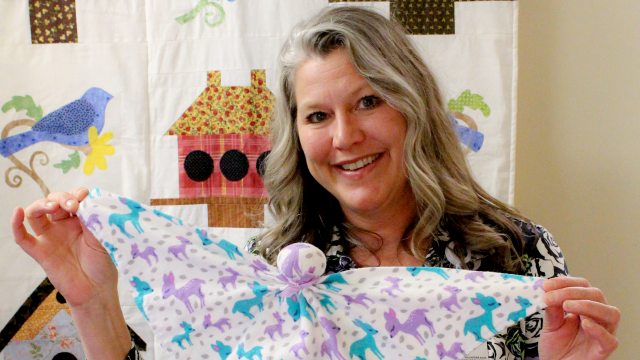Dolls help NICU babies use sense of smell to bond with parents

Volunteers cut and sew hundreds of “lovey dolls” every year
When Angila Petris couldn’t be with her newborn son, there was one thing she could leave behind to remind him of her…her scent.
Rhys was born nearly three months early in Coos Bay, Oregon, and was transported to the neonatal intensive care unit (NICU) at PeaceHealth Sacred Heart Medical Center at RiverBend in Springfield, Oregon, about 100 miles away from his family’s home.
His mom and dad were able to stay nearby at the Heartfelt House and visit the unit frequently. When they couldn’t be with him, their minds were eased by leaving a “lovey doll” with their scent.
A little more connected
“It gave me comfort to feel that he felt a little more connected to me,” Angila says.
Rhys and his parents are among about 650 NICU families who have benefited in the last year by using these little dolls, which are small squares of sewn soft flannel.
Parents of NICU patients receive a zippered baggie of two prewashed lovey dolls with instructions to sleep with or wear the doll next to their skin for a few hours — long enough for the material to absorb some of mom’s or dad’s scent.
Premature babies (preemies) have underdeveloped senses, says Roxanne Cole, the nurse educator in the NICU. “We want to avoid sensory overload, but we don’t want sensory deprivation either.”
Sense of smell is one of first
And that’s why lovey dolls work so well. “The sense of smell is one of the first senses that develop,” she says. “Having the baby exposed to the scent of mom and dad is crucial to development. We used to ask moms and dads to bring in gauze or a hanky with their scent, but lovey dolls are so much nicer.”
To anyone with fully developed senses, a mom-scented doll probably won’t smell like much, but babies who are so fresh to the outside world will recognize mom’s smell from their time inside the womb.
“Research is showing that the smell of mom lowers a baby’s stress.” according to Patty O’Connell, PT, who started the practice of using lovey dolls at PeaceHealth after she and her co-worker Nadine Dockey, PT, learned about them while training at another hospital system.
Nurses in the NICU have seen first-hand how a fussing baby will calm down when a doll with the parent’s scent is tucked nearby. The baby’s heart rate will come down and oxygen levels will go up, says Roxanne.
Parents of preemies can sometimes feel a little helpless. “We encourage parents to be here, doing what they can with their baby — whether that’s cuddling or softly reading or talking to them.” Lovey dolls help parents provide something that only THEY can provide to comfort their little one.
After a certain point, though, dolls are no longer needed. In fact, to prevent the dangers of possible suffocation, their use is discouraged once babies are ready for an open crib.
A comforting keepsake
Once the need for a lovey doll is outgrown, parents can take the dolls home as a keepsake or a source of comfort in the future.
Because lovey dolls aren’t reused or passed on to others, the PeaceHealth NICU relies on the hospital volunteer office to keep their doll closet stocked.
Jill Day, a volunteer coordinator at the hospital, has been involved in this effort from the get-go. She found a pattern online and researched the best materials.
She buys all the fabric new — as much as 30 bolts at a time — in cute baby prints and patterns. Because preemies’ skin is sensitive and because these babies are so susceptible to germs, only certain types of fabric are used and only purchased new from the store, to ensure consistent quality and safety.
Anyone can sew
Jill organizes work parties of “Heartwarmers,” a group of “crafty” volunteers, to cut and assemble kits that include instructions and enough NICU-approved materials to make four dolls. Once sewn, finished dolls are packed in zippered baggies with instructions for parents. (In addition to the lovey dolls, Heartwarmers also stitch together “continuation quilts” to share with patients in hospice.)
Anyone can pick up a kit from Jill in the volunteer office and sew some dolls. To date, volunteers have made more than 1,300 and counting.
As long as babies keep being born too early, volunteers can expect to keep those sewing machines humming. Lovey dolls are here to stay — helping babies bond with moms.
“We’ve heard really good feedback from parents,” Patty notes.
Roxanne agrees, “Moms love doing this. It’s a way of being with their baby when they’re not here. It’s something they can do for their babies.”
As of this writing, Rhys is now almost nine weeks old (though still shy of being full-term gestationally) and has outgrown his lovey doll. That’s fine. Angila hopes to soon be able to take him home where he can snuggle with her…the real source of his comfort.
About the photo: Jill Day, volunteer coordinator at PeaceHealth Sacred Heart Medical Center at RiverBend, shows off one of the “lovey dolls” sewn by volunteers for parents with babies in the neonatal intensive care unit.





